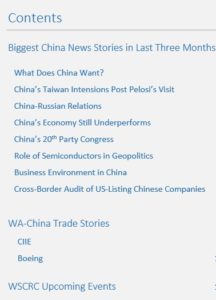As we enter 2023, the top story out of China is the sudden reversal of it zero-COVID policy and the subsequent national wide spread of the virus. While anecdotal stories describe huge swathes of the population being infected and widespread deaths, the government has stopped reporting case counts and fatalities. The concern, heard worldwide, is a lack of transparency from the Chinese government and a concern about new variants that might arise from China.
Now that Xi Jinping has been appointed for another five-year term as China’s leader, there is hope that he may be willing to be more conciliatory in relations with the U.S. Although a break-through in major power relations is not expected, recently Xi has softened his tone in what may be an effort to improve ties with the U.S. Whether this is just an attempt to reduce U.S. sanctions imposed on issues such as semi-conductors or Xinjiang is yet to be seen. China’s strong support of Russia continues to be a major deterrent to improving ties with the U.S. As reported below, Xi is back travelling again to strengthen China’s global position.
For many years, observers of China predicted that China’s economy (on a $ basis) would exceed that of the U.S. by 2030 or earlier. However, those predictions are being called into question as the Chinese economy has slowed due to its stringent COVID policies, which have severely impacted its important real estate sector and led to a slump in productivity and consumer demand. Our articles on both the Chinese Economy and China’s real estate sector probe into these issues more deeply.
Closer to home we highlight the drop of in the number of Chinese students studying in the U.S., which has dropped by 22% from peak numbers just three years ago. At the University of Washington, the decrease has only been 5.4%.
 uarter, the tensions between U.S. and China shows no sign of easing, especially after House Speaker Nancy Pelosi’s Taiwan visit. Despite the harsh environment, the Council—in cooperation with its educational arm, the Washington State China Relations Fund—continues to produce programs in an effort to present a more nuanced picture of the U.S.-China relationship. In this report, we analyzed some of the big news in the U.S.-China relationship since in the last three months. We also provided an update on the WA-China trade interactions, including the China International Import Expo and Boeing’s strategy with the Chinese market.
uarter, the tensions between U.S. and China shows no sign of easing, especially after House Speaker Nancy Pelosi’s Taiwan visit. Despite the harsh environment, the Council—in cooperation with its educational arm, the Washington State China Relations Fund—continues to produce programs in an effort to present a more nuanced picture of the U.S.-China relationship. In this report, we analyzed some of the big news in the U.S.-China relationship since in the last three months. We also provided an update on the WA-China trade interactions, including the China International Import Expo and Boeing’s strategy with the Chinese market.